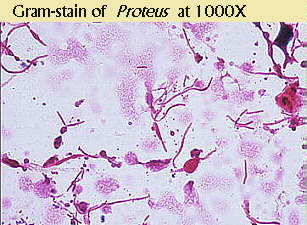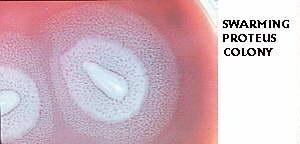PROTEUS
PROTEUS

Proteus, like almost every other bacterium in this family, can cause urinary tract infections and hospital-acquired
infections. Proteus is unique, however, because it is highly motile and does not form regular colonies.
Instead, Proteus forms what are known as "swarming colonies" when plated on non-inhibitory media. The most important
member of this genus is considered to be P.mirabilis, a cause of wound and urinary tract infections. Fortunately,
most strains of P. mirabilis are sensitive to ampicillin and cephalosporin. Unlike its relative, P. vulgaris
is not sensitive to these antibiotics. However, this organism is isolated less often in the laboratory and usually
only targets immunosuppressed individuals. P. mirabilis and P. vulgaris can be differentiated by an indole
test for which only P. vulgaris tests positive.

LABORATORY INDICATIONS:
- Lysine -
- Hydrogen sulfide +
- Motile
- Urease +




Copyright © 1995 University of Texas - Houston Medical School, DPALM MEDIC, All rights reserved.






